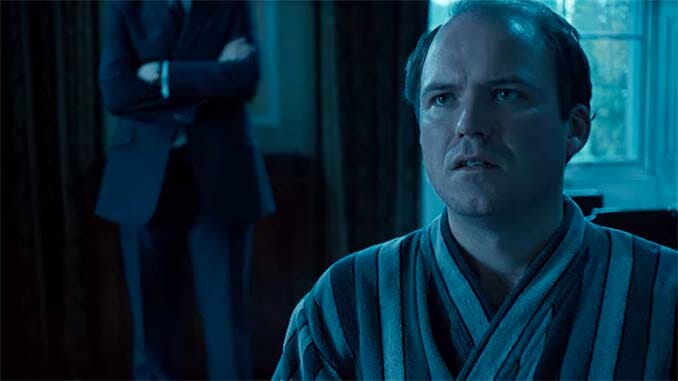Future Past: Black Mirror Season 1 at 10
Photo Courtesy of Channel 4
Ten years ago, the British dystopian anthology series Black Mirror aired its series premiere “The National Anthem,” in which a ransom video is mass disseminated on YouTube demanding fictional prime minister Michael Callow (Rory Kinnear) broadcast unsimulated sex with a pig; his onscreen humiliation the only stipulation that ensures the release of a kidnapped royal. As an hourlong contained narrative, “The National Anthem” bore more similarities to a film event than an episode of television. That it’s now colloquially referred to as the “pig-f—ing episode” gives away the episode’s shocking conclusion: Callow does it. Embedded in this transgressive denouement is both a spectatorial wrist slap and clever narrative twist that Black Mirror became well known for. Callow’s porcine sex act is broadcast for an eager audience of millions, and the scene carousels through their reactions in packed pubs, on the job, or alone in their homes as expressions turn from anticipatory mirth to open-mouthed astonishment and finally repulsed endurance.
Such pronounced diegetic attention to spectatorship established Black Mirror as a self-reflexive show. Even as it seems obvious Callow’s viewers are a crowd of sheeple who should just look away, we’re also watching, fully aware of our own collective zeal for the bizarre public humiliation playing out (the series premiere on the UK’s Channel 4 drew an audience of 1.9 million viewers). A final twist wrings the conceit even tighter: The setup is a social experiment orchestrated by Carlton Bloom, a Turner Prize-winning conceptual artist, who releases the kidnapped princess 30 minutes before Callow’s broadcast—though the public is too distracted by schadenfreude to notice or care.
Seemingly minor in the context of Black Mirror’s five seasons, Carlton Bloom is a near cipher for the series’ signature authorial tone: ideologically observant yet provocative—and sometimes gimmicky. Though the show would later depend on a wide-ranging rolodex of writers, its first season was predominantly the brainchild of co-creators Charlie Brooker (a comedy writer) and Annabel Jones (a television producer). The Endemol colleagues went on to collaborate on various iterations of BBC’s Screenwipe and Channel 4’s sleeper zombie hit Dead Set. As Black Mirror gained momentum, Brooker (writer of the majority of its episodes) accrued auteur status in particular, which centered discourse on the conceptual thrust of each episode to the detriment of conversations around formal worldbuilding. Black Mirror’s creators embraced its cinematic parallels, ardently referring to episodes as “films”—a comparison that became more pronounced when, in 2016, Netflix acquired rights to commission the third season onwards.
Cinematic aspirations have always been interwoven with conversations around prestige TV. In 2011, amongst series that favored longform drama and strategically drawn out character arcs, the standalone narratives of Black Mirror episodes were unique. It unsettled audiences by aggressively refusing narrative closure, opting for murky, ambiguous endings that left many stones unturned. Like two other major television debuts in the same year, Game of Thrones and American Horror Story, Black Mirror committed to the cruelty of its world by crushing characters and viewers alike, revealing incisive awareness of narrative pleasure and audience expectations joined by a willingness to subvert both. Though rooted in science or speculative fiction, Black Mirror also conveyed a talent for genre pastiche—especially drawing on horror and satire. Glossed with a certain comedic absurdity, “The National Anthem” also borrows the cinematic language of a political thriller; its mounting stakes are driven by decisions made in tiny rooms with consequences that play out in the public sphere.
Across its Season 1 triptych, Black Mirror also became known for nihilism that has been often exaggerated as near technophobia. Its sometimes clinical curiosity towards human behaviour exacerbated by technology was mitigated by strong performances from actors who embodied their characters with tortured humanity. The second episode, “Fifteen Million Merits”—the most exaggerated in its futuristic designs—is led by an outstanding early career performance from Daniel Kaluuya, who convincingly interpolates viewers into a nightmarish situation: a techno-hellscape contained in a single building where individuals sleep in pods walled in by screens, and who spend their days pedaling stationary exercise bikes. They’re inundated by televisions that steadily stream a limited roster of programming, including fatphobic prank shows; first person shooter games; an exploitative porn channel called WraithBabes; and Hot Shot, a thinly veiled version of The X-Factor. Cyclists are rewarded for the media they consume in points, but penalized when they look away.
In Black Mirror’s first episodes, interpersonal connection is fleeting if not doomed, a dynamic that later seasons softened. When cyclist Bing (Kaluuya) overhears Abi (Jessica Brown Findlay) singing Irma Thomas’ “Anyone Who Knows What Love Is (Will Understand),” her authenticity slices through the artificiality of his world and he convinces her to audition for Hot Shot, paying for her golden ticket with the majority of his saved points. The naivety of Bing’s plan is revealed when Abi takes the stage: the quality of her audition doesn’t really matter; the judges—acerbically named Wraith, Hope, and Charity—see more potential in her appearance, cornering her into accepting a role as a porn performer on WraithBabes. Overcome with guilt and frustration, Bing tries to upend the system by delivering an impassioned monologue while holding a knife-like shard of glass from a screen to his throat, only to have this rebellion commodified when Judge Hope offers him a radio slot on one of his channels.
-

-

-

-

-

-

-

-

-

-

-

-

-

-

-

-

-

-

-

-

-

-

-

-

-

-

-

-

-

-

-

-

-

-

-

-

-

-

-

-








































